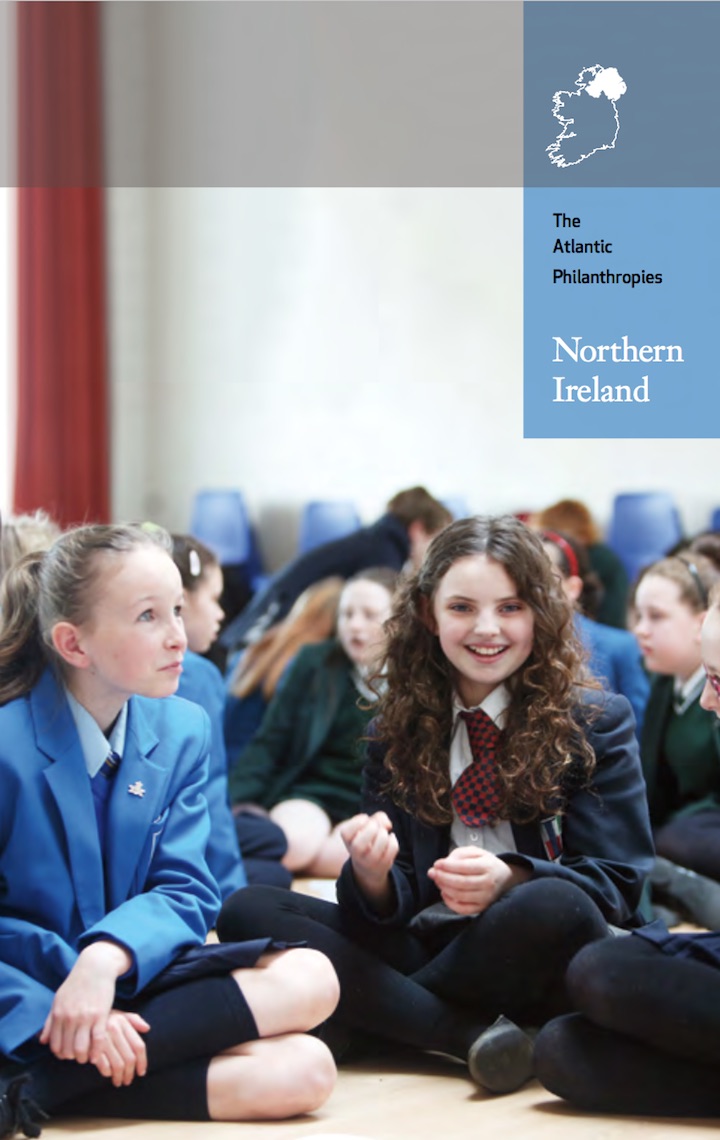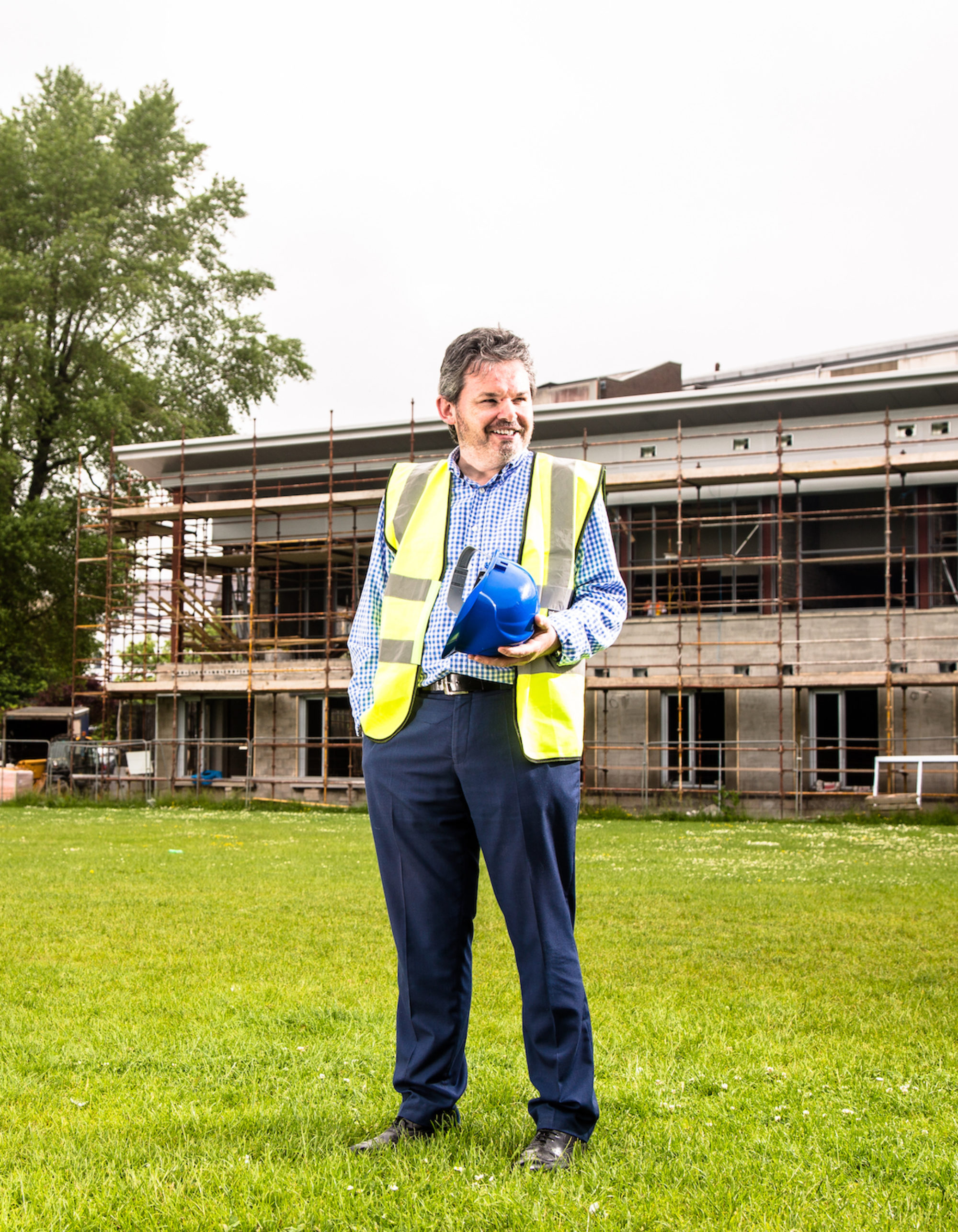Country Book Northern Ireland
About the Book
The Story.
The Impact.
The Lessons.
From 1991 through 2016, The Atlantic Philanthropies invested $570 million in Northern Ireland. Atlantic’s grantmaking helped promote peace, reshape education, improve public services, and strengthen organizations to promote and protect people’s rights.
What the book covers:
- How Founder Chuck Feeney’s initial efforts in Northern Ireland focused on helping to end the Troubles.
- People and groups the foundation supported.
- What Atlantic’s grantees accomplished.
- Lessons from the work.

Summary
Chuck Feeney’s Interest in Northern Ireland
Atlantic’s involvement in Northern Ireland began with the direct, personal effort of Chuck Feeney in supporting peace initiatives leading to the Belfast/Good Friday Agreement of 1998 that formally ended decades of conflict known as the Troubles. Afterward, Atlantic helped implement the peace agreement, with a focus on promoting justice and human rights; encouraging cooperation across communities, particularly in education; and integrating marginalized groups, including former combatants, in a post-conflict society.
Feeney’s interest in Northern Ireland can be traced back to his family’s origins in County Fermanagh. He believed that Northern Ireland harbored a great wealth of under-valued assets in higher education and research, which the violence during the years of the Troubles had hampered.
Spurring Higher Education
Feeney’s greatest personal interest lay in advancing scholarship and economic development through the expansion of universities, research institutes and medical centers. As a result, university campuses across the North, particularly in Belfast and Derry/Londonderry, now feature a wide array of Atlantic-supported facilities and equipment.
The Support Programme for University Research (SPUR) was a partnership between Atlantic and the government, modeled on a similar program in the Republic of Ireland, to draw greater public and private investment into advanced scholarship for research. From 2001 to 2008, the program provided a total of $71.8 million to Queen’s University and the University of Ulster.
Atlantic also helped both universities become more ambitious and adept at private fundraising — something relatively rare in Northern Ireland. The goal was not only to support the university and research sector directly, but to equip them to draw support from others long after Atlantic’s grantmaking had concluded.
Emerging from Anonymity
Until 2002, Feeney and Atlantic acted anonymously, and recipients were not permitted to disclose the source of their grants. After the foundation lifted its anonymity policy, its staff and advisors were much better able to build trust and working relationships with civil society and public agencies.
As part of its expanded relationship with government, Atlantic helped embed the principle of prevention and early intervention in public policy on children’s services. This has led to an increased emphasis on supporting families in the earliest years of their children’s lives, to avoid problems and the need for more costly services later.
Atlantic also supported innovative approaches to cross-community education. Efforts included both integrated schools, where Protestant and Catholic students enroll together, and the more widely accepted model of shared education, in which students from different communities spend parts of their school day using facilities or taking classes in one another’s schools.
Limiting Atlantic’s Life
In 2002, Atlantic announced that it would distribute its full amount endowment and make its last grant commitments in 2016. This put a premium on accomplishing as much as possible in less than two decades. But it also imposed an extra responsibility on organizations receiving Atlantic support: They would need to build their fundraising prowess to continue operating at the same scale once Atlantic’s support ended. Many organizations rose to the challenge, but, in the tightened economy after the financial crash of 2008, not all were successful.
Some grantees wonder what will happen to major public policy reforms in a few years, when the thrust of major philanthropic funding has disappeared and the principles of reform will have to stand or fall solely on the strength of government commitment. One cause for optimism came in mid-2016, in an analysis of public-sector reform in Northern Ireland by the OECD (Organisation for Economic Cooperation and Development). In its review, the OECD cited several Atlantic-sponsored reform initiatives and concluded:
- Promotion of evidence-based policymaking and service design is having a growing impact
- Atlantic’s work is among the few effective cross-sectoral initiatives OECD could find
- Focus on prevention and early intervention and on the importance of robust evaluation has been influential
- Atlantic, its grantees and the governance structures of the Atlantic/government partnerships have created capacity to take reforms forward.
Timeline
Atlantic in Northern Ireland, 1991 - 2016
-
1982
The Atlantic Philanthropies founded
-
1987
Feeney deeply affected by deaths in IRA bombing in Enniskillen, near his ancestral home
-
1991
First grant (NI Council for Integrated Education: £5,500)
-
1993
Feeney and other Irish Americans meet with Gerry Adams of Sinn Féin
-
1994
Feeney personally funds Sinn Féin office in Washington to promote political alternative
-
1995
1st Restorative Justice grant (NI Association for the Care and Rehabilitation of Offenders)
-
1996
Belfast office opens
-
1997
The New York Times reveals Feeney as major philanthropist
-
2001
Enters 7-year partnership with government for Support Programme for University Research (SPUR)
-
2002
Board decides to be a limited-life foundation
-
2007
Feeney participates in launch of power-sharing government
-
2012
All universities of Ireland confer first-ever joint Honorary Degree to Chuck Feeney
-
2014
Establishes partnership with government to accelerate national dementia strategy and children's programs
-
2015
Belfast office closes
-
2016
Last grant to Northern Ireland grantee (NI Human Rights Consortium: £100,000)

Top Lessons
Our Top Takeaways
Grantees, staff and partners interviewed for this book often noted these lessons from Atlantic’s experience in Northern Ireland:
- Philanthropy is not a solitary endeavor; it is essential to find common ground with other funders — prominently government — on which to build a grantmaking strategy.
- Substantial grants can have a multiplying effect, that can be used to lever other funding in the longer term to produce sustainable outcomes. It can also leave a void, unfilled by other donors, when the grantmaking ends.
- Anonymity was a significant issue and often a problem for grantees, particularly in Northern Ireland where there were suspicions about the source of funds.
- The value of constant, vigorous and open communication among the foundation, its grantees and other partners cannot be overstated.
- Large grants gave a competitive edge to larger organizations that could manage large sums of money and sometimes upset the working balance within a field.
- Support for capital projects proved to be an effective way of helping grantees with material needs, and elevating them as a presence in civil society.
- Atlantic’s selectiveness about grantees, persistence in pursuing a strategic agenda, and willingness to persevere through tensions and setbacks made for strained relations at times
- It is essential to prepare both grantee and other funders early and consistently by planning in earnest with persistent messages and actions about the end of grantmaking more than five years out.

Grantee Stories
Our grantees have stories to tell.
The book includes a series of vignettes with personal stories from these grantees:
- Northern Ireland Alternatives
- Lifestart Foundation
- The Detail
- Suffolk Lenadoon Interface Group
- Alzheimer’s Society NI – Dementia Friendly Communities
- Sonic Arts Research Centre, Queen’s University
- Integrated and Shared Education
- Committee on the Administration of Justice
- South Tyrone Empowerment Programme (STEP)

Download
Read it now.
Atlantic’s grantmaking in Northern Ireland helped promote peace, reshape higher education, improve public services, and strengthen organizations to promote and protect people’s rights.
The Atlantic Philanthropies: Northern Ireland tells the detailed story of how one man’s generosity has had an extraordinary impact.
Download the full book (PDF) ›
Further Reading
